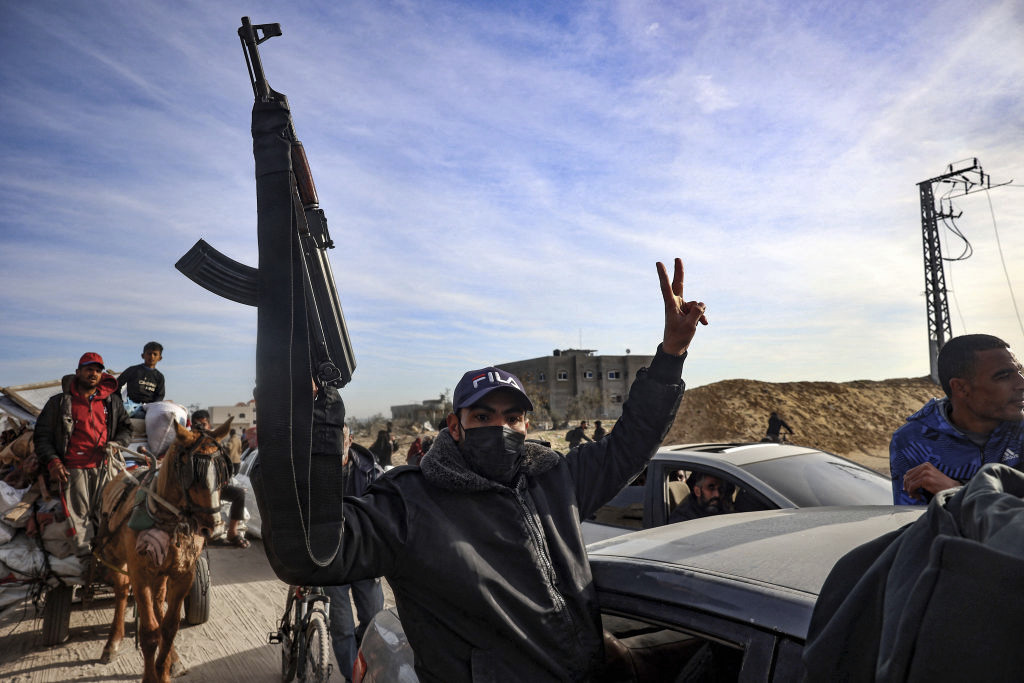
Those who think that the Iran-backed Palestinian terrorist group Hamas will abandon its Jihad (holy war) to murder more Jews and destroy Israel in the aftermath of the recent ceasefire-hostage agreement are mistaken.
Although the agreement may put an end to the current conflict between Israel and Hamas, it does not, in any way, reflect a shift in the radical and dangerous ideology of the Islamist group, as outlined in its 1988 Covenant. The document quotes Hassan al-Banna, the founder of the Muslim Brotherhood organization (of which Hamas is an offshoot), as saying: "Israel will arise and continue to exist until Islam abolishes it, as it abolished what went before."
The main points of the Hamas Covenant state:
- The Palestinian issue is a religious-political Muslim problem, and the conflict with Israel is between Muslims and the Jewish "infidels."
- All Palestine is Muslim land and no one has the right to give it up.
- An uncompromising Jihad must be waged against Israel, and any agreement recognizing its right to exist must be totally opposed.
The ceasefire-hostage deal does not require Hamas to disarm or cede control over the Gaza Strip. As far as Hamas is concerned, this is just another deal similar to ceasefire agreements reached with Israel after previous rounds of fighting over the past 20 years. The terrorist group seems to be convinced that the deal will enable it to keep control of the Gaza Strip and prepare for more massacres of Jews.
Shortly after the ceasefire-hostage deal was announced on January 15, Hamas leader Khalil al-Hayya made it clear that his group intends to pursue its Jihad against Israel.
Referring to the Hamas-led October 7, 2023 attack on Israel, resulting in the murder of 1,200 Israelis and the wounding of thousands, al-Hayya said:
"The al-Aqsa Flood [the name Hamas uses to describe the October 7 atrocities] constitutes a significant turning point in the history of the Palestinian cause the resistance, and its repercussions won't stop until the liberation of occupied Jerusalem."
He went on to hail the October 7 massacres as "a military and security achievement that will remain a source of pride for the Palestinian people," and praised Iran for supporting the Palestinian "resistance" and firing missiles at Israel during the war.
In response to the ceasefire-hostage agreement, a Hamas statement said:
"This is an achievement for our people, our resistance, our nation, and the free people of the world. It is a turning point in the conflict with the [Israeli] enemy, on the path to achieving our people's goals of liberation and return."
"Liberation" refers to Hamas's declared goal of eliminating Israel and replacing it with an Islamist state. "Return" refers to the Palestinian demand to flood Israel with millions of "refugees" so that Jews would become a minority in their own homeland.
In yet another sign of Hamas's intention to continue the fight against Israel, supporters of the terrorist group took to the streets of the city of Khan Yunis in the southern Gaza Strip to celebrate the ceasefire-hostage deal and chanted: "We will go to Jerusalem, we will sacrifice millions of martyrs!"
Members of Hamas's military wing, Izz a-Din al-Qassam Brigades, also joined the celebration and declared: "We are on the battlefield and we will remain on the battlefield."
The celebrations spread to the West Bank, where Hamas supporters in Ramallah, the de facto capital of the Palestinian Authority, chanted slogans in support of slain Hamas leaders Yahya Sinwar and Mohammed Deif, the masterminds of the October 7 carnage.
Ahmed Fouad Alkhatib, a former resident of the Gaza Strip and Senior Fellow with the Atlantic Council, wrote on January 14:
"The reality is that the Islamist terrorism of Hamas, masquerading as 'resistance,' has achieved nothing for the Palestinian people except for billions of dollars in wasted resources and tens of thousands of needless deaths, with Gaza in ruins after 20 years following the [Israeli] withdrawal of settlements [from the Gaza Strip] in 2005. Indeed, there will be a reckoning with Hamas after the war is over, and the group must be put on metaphoric, intellectual, and literal trials for its crimes against the Palestinian people's aspirations and national project....
"Hamas's propaganda machine, run by Qatari-state media, Aljazeera Arabic, will work overtime to help the terror group turn a catastrophic disaster into a victory akin to the battles of Stalingrad and Leningrad, desperately seeking to promote terrorism and the armed resistance narrative as one that is heroic and valiant when it is cowardly, [and] ineffective..."
A ceasefire-hostage deal that allows Hamas to remain in power means that it is only a matter of time before the terrorist groups attempts to launch another October 7-style attack on Israel. The new US administration, to avoid more violence and bloodshed, must insist that Hamas be removed from power.
This can only be accomplished by applying pressure and sanctions on Hamas's Qatari and Iranian sponsors. Hamas must be totally defeated and eliminated, not rewarded for committing the biggest crime against Jews since the Holocaust.
Hamas's defiant statements after the ceasefire-hostage agreement was reached, demonstrate the terrorist group's resolve to carry on attacking Israel. The statements also show that Hamas's leadership is willing to sacrifice more of its people to fulfill its objective of destroying Israel. Clearly, it has not learned any lesson from bringing disaster upon the Palestinians. Hamas leaders do not care if tens of thousands of Palestinians are killed as part of its Jihad against Israel. Furthermore, Hamas leaders apparently are not interested in rebuilding the Gaza Strip and providing its residents with safety, stability and prosperity. Rather, their primary goal, evidently, is still to murder as many Jews as possible.
The only deal that will actually bring peace is a ceasefire where Hamas ceases to exist.
Khaled Abu Toameh is an award-winning journalist based in Jerusalem.


